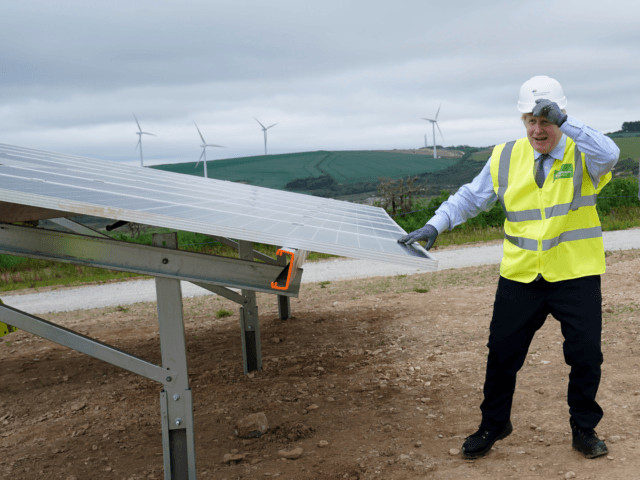The United Kingdom should resume fracking for natural gas with “the vigour of a national war effort” to ensure its energy independence amid the Russian conflict with Ukraine, Conservative MPs have demanded.
While Europe is facing the consequences of — as Prime Minister Boris Johnson put it — being “addicted” to gas and oil from Russia, the British government is also facing calls to unleash the shackles of the green agenda and resume fracking operations that were halted in 2019.
Conservative MPs in the Net-Zero Scrutiny Group have claimed that the decision to shut down fracking sites in Britain came as a result of a “false pretext” of the mining process causing earth tremors and that the cost of failing to tap domestic resources outweighs any potential negatives.
Former Brexit Minister, Tory MP Steve Baker told The Telegraph: “There’s a war on which appears to be possible only because Europe is, as the PM said, addicted to Russian gas. While Putin bears responsibility for the ultimate war crime of initiating a war of aggression, everyone who allowed our shale gas to remain in the ground on a false pretence should hang their heads in shame as the Ukrainian people fight and die for their country.
“Boris should immediately stop the concreting in of current shale wells and go for gas with all the vigour of a national war effort, which this very nearly is,” Baker added, warning: “Our civilisation may depend upon it.”
The group of Tory MPs, who are opposed to Prime Minister Boris Johnson’s Build Back Better green agenda which seeks to transition the UK’s economy to such an extent by becoming “carbon neutral” by the year 2050, have cited reports from the Oil and Gas Authority (OGA), which later revealed that reported tremours surrounding fracking sites were not as significant as initially claimed.
In November of 2019, the government pointed to a “disturbance” of a 2.9 magnitude tremor which led to the shuttering of the Preston New Road site in August of that year. However, a report from the OPA found that during the tremor, 50 buildings experienced either “no structural damage” or “slight structural damage” including damage to plaster or hairline cracks in walls.
The report also discussed two other instances of tremors at the site, recorded at 1.1 and 1.5 on the Richter scale, claiming: “Generally, the motions can be considered as almost imperceptible and well below the level of vibration that people experience going about everyday activities.”
One reason for the widespread concern over the tremor may have been on how the government collects such data, the OGA admitted, saying: “It is noted, however, that these ‘did-you-feel-it?’ reports are self-submitted online and therefore unverified.”
In light of the findings, the chairman of the Net-Zero Scrutiny Group, Craig Mackinlay said: “With the UK and Europe facing a real energy cost and supply crisis, we need to ask ourselves which is preferable: further financing of the Russian war machine through gas purchases or, as now even the OGA is saying, accept the small, barely perceptible inconveniences of onshore fracking which would bring energy security, jobs, investment, tax revenues, lower prices, balance of payments benefits and CO2 savings. It should be an easy answer.”
A government spokesman disagreed with the idea of opening up gas production, saying: “Fracking would have no effect on domestic energy prices in the near term. To boost energy security, we need to move away from expensive fossil fuels and generate more cheap, clean power in the UK.”
Even prior to the Russian invasion of Ukraine and despite the fact that the UK only receives around 3 per cent of its gas from Russia, millions of households in Britain were facing the prospect of being plunged into fuel poverty amid the global surge in energy costs since last summer.
Earlier this month, the nation’s energy regulator announced that those not on a fixed deal would see their annual energy prices rise by 54 per cent to £1,971, a £693 increase.
Despite this, Prime Minister Boris Johnson’s government has so far refused to cut taxes on energy, including the Value Added Tax (VAT), which Mr Johnson previously touted as a potential benefit of Brexit. Estimates have also claimed that as much as 25.5 per cent of the average household energy bill is paid in taxes to fund so-called green energy projects.
Though it is disputed, and is difficult to determine due to the lack of a domestic fracking industry, estimates have claimed that the Bowland Shale deposits could contain between 200 and 1,300 trillion cubic feet of gas volume, alone.
Follow Kurt Zindulka on Twitter here @KurtZindulka

COMMENTS
Please let us know if you're having issues with commenting.